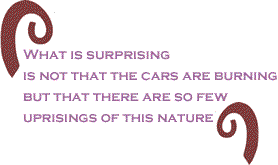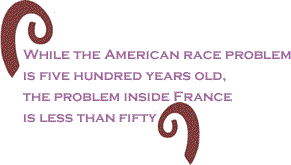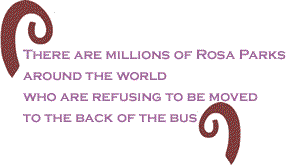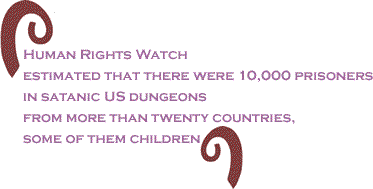
|
|||||||||||||||||||||
This article originally appeared in the Jamaica Observer. "Man is born free and everywhere is in chains" was said by a Frenchman, Jean Jacques Rousseau. Two centuries after Rousseau, another Frenchman, one Nicholas Sarkozy describes millions of his fellow citizens as "scum" - among several other pungent epithets directed at them because they happen not to belong to what Sarkozy clearly conceives of as the master race. Fortunately for France, its president - himself no paragon of egalitarian virtue - is at least more intelligent and civilized than Sarkozy. Speaking at a news conference with the visiting Spanish Prime minister, President Chirac said: once order is restored, France will have to ''draw the consequences of this crisis, and do so with a lot of courage and lucidity." ''There is a need to respond strongly and rapidly to the undeniable problems faced by many residents of underprivileged neighborhoods around our cities," It seems that the statesmen of the world are divided, like the general populations, into the realists and the fantasists. Sarkozy wants Chirac’s job and he is appealing to the crasser sentiments of his fellow citizens, a sizeable portion of whom voted for Chirac’s racist opponent last time the president was elected. He calculates that with the hardcore of the Gaullist movement allied to the far right fascism of the ultra nationalists, his bid for the presidency is all but assured.
It may well be, but a Sarkozy government of France may very well provoke the defining convulsion of the 21st century - civil commotion which will not be confined to France or to Europe but spread to the whole world. As Tony Blair has been told by a panel of advisers, reacting violently to terrorism is more likely to spread the disorder than contain it. His parliament was wiser than Blair; they defeated his proposal for 90-day police detention without trial. American observers of the nearly two weeks of rioting in France have consoled themselves with the thought that the underclass exposed by Katrina was as nothing compared to the French landscape of burning cars and looted shops. They forget that while the American race problem is five hundred years old, the problem inside France is less than fifty. And despite the mess they made of Haiti, the French did have the nerve and the humanity immediately after the Second World War, to try however timidly, to integrate their colonies into their nation. They can also point to such as Gaston Monnerville, a black man born in French Guiana (Cayenne), President of the French Assembly and of the French Senate, French delegate to the inaugural meeting of the UN in 1945. They can also point to Alexandre Dumas and even to Napoleon’s Empress Josephine. The United States has no comparable examples. If, however, Sarkozy goes where only [Vichey Nazi-collaborator government leader Marshal] Petain has gone before, it seems pretty clear that he will bring down on France and probably Europe and possibly much of the world, the conflict which the fundamentalist Christians have been waiting for, the clash between civilizations, the war between Islam and Christianity: Armageddon. (Incidentally, this week, the remains of a Christian church were found at Armageddon.) Naima Bouteldja, on Z-Net, quotes Laurent Levy, a founding member of the Movement of the Indigenous of the Republic, a network which campaigns against the "oppression and discrimination produced by the post-colonial [French] Republic." Levy says "the explosion is long overdue. When large sections of the population are denied any kind of respect, the right to work, the right to decent accommodation, and often the right to even access clubs and cafés, then what is surprising is not that the cars are burning but that there are so few uprisings of this nature." There is a structural peculiarity in the French North African ghettos: because they were purposely built to accommodate the immigrants, there is very little communal mixing. Structurally, discrimination is therefore much easier; as in the Jamaican slums, your postal address condemns you. In the French ghettos, one in two inhabitants is under 20, and nearly one in two is unemployed. The stimulus for the recent riots was the electrocution of two youths coming from a football match who hid in an electricity substation simply to avoid the identity checks and police harassment which are a daily torment. A Euphemism for Slavery The pundits of the western world are sure that all France needs to overcome these problems is to embrace globalization and to tear down its welfare state. The problem, as millions in France and in this hemisphere see it - is that globalization is another word for imperialist exploitation and competitiveness is a euphemism for slavery.
When Chirac says "Whatever our origins, we are all the children of the republic and we can all expect the same rights," he is in direct opposition to the rightwing globalizer, Sarkozy, who dismisses Chirac's "children of the republic" as "yobs," "fundamentalists," "riff-raff," and "vermin" and speaks of the need for the suburban ghettos "to be cleaned out with Karsher" - an industrial cleanser. Sarkozy’s problem, and George Bush’s, is that fifty years on there are millions of Rosa Parks around the world who are refusing to be moved to the back of the bus. This month in Mar del Plata, tens of thousands showed up to explain their feelings to Mr. Bush, only to be dismissed by the US press as just another bunch of unruly noisemakers. The US press general tried to downplay the size of the protest and to connect the peaceful demonstration addressed by Hugo Chavez and Cindy Sheehan, among others, to the nihilistic troublemakers who torched banks and multinational brand named shops hours later and miles away. It was strange that forty years after the US managed to throw Cuba out of the Organization of American States, another US president was trying to neutralize another Latin spokesman and hero. Forty years ago it was Che Guevara, leading the Cuban delegation as Minister of Economics, who told the Americans that their mini-globalization project - then called Alianza para Progreso: Alliance for Progress - would not work. Last week Hugo Chavez was saying the same thing about the Free Trade Area of the Americas. This time the anti-hero, Chavez, had with him not only the crowd, as Guevara had, but the presidents of Latin America’s most important nations. Forty years ago these countries were ruled by American approved caudillos. This week, former Peruvian strongman Alberto Fujimori is in jail in Chile and Evo Morales, an indigenous American, is favored to become the next president of Bolivia. Morales also spoke at the demo in Mar del Plata with Chavez, making it clear that as far as his Movement Toward Socialism was concerned, national resources were national property to be used in the national interest. Across the Atlantic, in Nigeria, the Ogoni people were this week in the tenth year of their mourning for their hero, Ken Saro-Wiwa, who they say was executed by the government of their country by the military dictator Sani Abacha, a man who got along well with the transnational corporations. The Ogoni people say Saro-Wiwa was framed by the military. In a memoir published this week Saro-Wiwa’s son and namesake wrote: "His death on 10 November 1995 shook the world. John Major [then British PM] described the trial that sent him to the gallows as a ‘fraudulent trial, a bad verdict, an unjust sentence.’ Nelson Mandela thundered that 'this heinous act by the Nigerian authorities flies in the face of appeals by the world community for a stay of execution.' Bill Clinton and the Queen added their voices to the worldwide condemnation, Nigeria was suspended from the Commonwealth, countries recalled their diplomats and there were calls for economic sanctions and a boycott of Shell oil." Ten years later, Shell still devastates the Ogoni homeland with oil spills and other environmental abuse and waste. More than 900 million barrels of Nigerian sweet crude (the easiest to refine and most profitable) have been pumped out of the Ogoni homeland since 1958:
Western governments now get more from gasoline taxes than the oil producing states get for selling the raw material to the oil companies. The US and Canadian governments get slightly less than the equivalent of the FOB price, which itself is more than the oil producers get. Japan, Italy, Germany, France and particularly the United kingdom, get considerably more from oil than the oil producing states or even the companies. And when one considers that this year one oil company, Exxon-Mobil, in three months had over $100 billion in sales and more than $9 billion in profits, you may appreciate the kind of money being made outside of the oil producing countries. In the Niger delta, public dissatisfaction with the unsustainable mining of oil has taken drastic forms. There is sabotage, kidnapping and murder. There is also increasingly sophisticated siphoning of oil from pipelines, now estimated to cost Shell up to 15% of daily production - for resale to tankers bound for the world market!! Free enterprise for you.
Delta residents - most of whom earn less than $1 a day - accuse oil companies of colluding with Nigeria's government to foment divisions between rival community groups in a strategy to deprive them of benefits from oil . That doesn’t happen in Venezuela, where the government of Hugo Chavez has nationalized the oil industry. For decades Venezuela has been one of the world’s largest oil producers (it is now number five and Nigeria is eighth) but the people of Venezuela never saw the benefits of their oil riches. Under Chavez things have changed. Oil revenues are being poured into public works and social programs. A nationwide chain of low price supermarkets is run by the state, thousands of schools have been built, there are thousands of medical clinics staffed by Cuban doctors and university education is free and is available to almost anyone who wants it. Outside of Venezuela Chavez is exchanging oil for medical and other technical assistance from Cuba and is funding, through the PetroCaribe agreement, a plan to bring cheaper fuel and the chance to invest savings to Caribbean countries including Jamaica. No wonder Chavez is a superstar in Latin America. No wonder Mr. Bush and his cohorts hate him. Chavez is to Bush the political equivalent of avian flu: enormously dangerous and extremely contagious. No wonder that Bush intimates such as the Rev. Dr. Pat Robertson consider Chavez such bad news. In October, a few months after having half apologized for advocating the murder of Chavez, Robertson said on CNN: " [The US ] could face a nuclear attack from Venezuela … The truth is, this man is setting up a Marxist-type dictatorship in Venezuela, he's trying to spread Marxism throughout South America, he's negotiating with the Iranians to get nuclear material and he also sent $1.2 million in cash to Osama bin Laden right after 9-11." The televangelist maintained that Chavez sent a "warm congratulatory letter to Carlos the Jackal, he's a friend of Muammar Qaddafi," he said. "He's made common cause with these people that are considered terrorists." Meanwhile, safe and sound in the US are Orlando Bosch and Luis Posada Carriles, two of the last century’s most dangerous terrorists, one pardoned by President Bush I, the other protected by a system which says he cannot be extradited to Venezuela because he might face torture there.
Of course the US is very sound on the question of torture. This week the US Senate voted to investigate how come it was disclosed in the Washington Post that the CIA had perhaps dozens of secret prisons cum torture facilities round the world. They didn’t vote to investigate the scandal, but to investigate those who brought it to public notice. They forgot, however, that we’ve known about the secret prisons for a long time. In May of last year Human Rights Watch estimated that there were 10,000 prisoners in these satanic dungeons from more than twenty countries, some of them children, some of them innocent adults just "scraped up" on suspicion. Among these is at least one journalist, a Sudanese employee of Al Jazeera - Sami Muhy al-Din al-Hajj, a Sudanese national, arrested by the US military while working for Al Jazeera during the US invasion of Afghanistan in 2001, and detained in Guantanamo for four years without trial. "Aljazeera.net spoke to al-Hajj's lawyer, Clive Stafford-Smith, regarding his case and the prospects for his release," the Qatar-based network reported. "He said al-Hajj had suffered extreme physical and sexual abuse and religious persecution." According to al Hajj, he is being tortured not for information but for something more important - to get him to accept American money to denounce his employers as an arm of Al Qaeda. When next the assorted heroes of journalism are saluted, perhaps the hero-makers might care to take a look at the case of Sami Muhy al-Din al-Hajj. Did I hear right: "extreme physical and sexual abuse" - in the War against Terror? John Maxwell of the University of the West Indies (UWI) is the veteran Jamaican journalist who in 1999 single-handedly thwarted the Jamaican government's efforts to build houses at Hope, the nation's oldest and best known botanical gardens. His campaigning earned him first prize in the 2000 Sandals Resort's annual Environmental Journalism Competition, the region's richest journalism prize. He is also the author of How to Make Our Own News: A Primer for Environmentalists and Journalists (Jamaica, 2000). Mr. Maxwell can be reached at [email protected]. Copyright©2005 John Maxwell |
|
| Home | |
Your comments are always welcome. Visit the Contact Us page to send e-Mail or Feedback or Click here to send e-Mail to [email protected] e-Mail re-print notice
If you send us an e-Mail message we may publish all or part of it, unless you tell us it is not for publication. You may also request that we withhold your name. Thank you very much for your readership. |
|
| November 17 2005 Issue 159 |
|||||||||
|
|||||||||
| Printer Friendly Version in Plain Text or PDF format. Download free Adobe Reader. | |||||||||
 |
|||||||||
 |
|||||||||
| |
|||||||||
| |
|||||||||




























